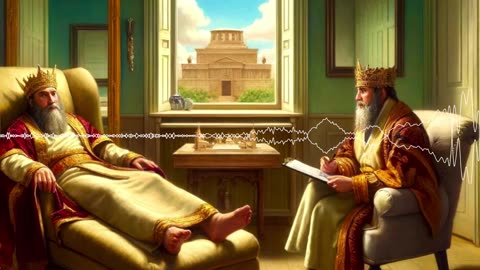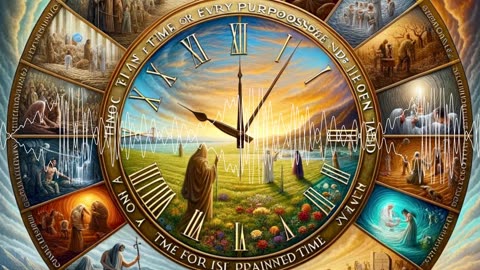
-
ECC 7 The "After Party" Doldrums of King Solomon AKA “Physician Heal Thyself”
ssovereigndaudThe "After Party" Doldrums of King Solomon AKA “Physician Heal Thyself” King Solomon, known for his unprecedented wisdom and the grandeur of his reign, experienced what many today might call the "after party" doldrums. After achieving one of his greatest accomplishments—the construction of a magnificent temple for Yahuah—Solomon found himself on cloud nine. This temple not only represented a pinnacle of religious devotion but also marked the height of his success and spiritual connection. However, what followed was an unexpected anticlimax; the grandeur of the temple could not fill the ensuing void. As the celebrations faded and life returned to its routine, Solomon began to grapple with a profound sense of disillusionment. Despite the splendor that surrounded him, Solomon’s subsequent reflections revealed a man in search of meaning beyond the material and temporal achievements. His quests led him through various life experiments, exploring different aspects of human existence, only to find them lacking. This journey, however, was not in vain. It brought forth invaluable insights—lessons distilled from the heights of joy and the depths of sorrow. Discussion: Seeking and Finding Solomon’s existential journey took him far beyond the opulence of his palace and deep into the essence of human experience. In this quest, he encountered everything that didn’t work, everything that failed to satisfy the human spirit in the long term. His experiments in living—ranging from accumulating wealth and indulging in pleasures, to seeking knowledge and exploring different philosophies—initially seemed futile. However, these experiences were not mere cynical exercises; they were a profound exploration of life’s fundamental questions. As Solomon emerged from his "after party" doldrums, he returned to us with a trove of wisdom. This wisdom, encapsulated in the book of Ecclesiastes, provides clear "takeaways" for navigating the complexities of life: 1. The Protective Power of Wisdom: Wisdom shields the mind as wealth shields the body, offering not just survival but a roadmap to thriving. 2. Moderation in All Things: Solomon teaches us the importance of balance—neither too righteous nor too wicked, each in moderation to avoid the pitfalls of extremes. 3. The Importance of Present Living: He advises us to abandon the nostalgia for the past and the anxieties of the future, urging us to live fully in the present and appreciate the now. 4. Acceptance of Life’s Dualities: Understanding that life is a mix of good and bad days, prosperity and adversity, and accepting these as part of the divine tapestry. 5. Endurance and Hope: The value of patience and the focus on long-term outcomes remind us that endurance through difficulties can lead to greater fulfillment. Conclusion: Solomon's Return In his return, Solomon doesn’t just bring warnings of life’s vanities but offers a guide to living meaningfully within the human condition. His wisdom, hard-earned and deeply personal, provides a beacon for all who seek purpose and fulfillment amidst the complexities of life. In sharing his reflections, Solomon ensures that his "after party" doldrums serve as a catalyst for our enlightenment, encouraging a life well-examined and deeply appreciated.113 views -
"Beyond Vanity: Discovering Life's Meaning in Ecclesiastes 6"
ssovereigndaudEcclesiastes 6 challenges us to confront the profound questions of existence and the often elusive pursuit of fulfillment. In a world overwhelmed by material excess and superficial desires, this chapter serves as a stark reminder of life's ultimate uncertainties and the limitations of worldly pleasures. "Beyond Vanity: Discovering Life's Meaning in Ecclesiastes 6" invites you to explore the depths of Solomon's reflections on wealth, satisfaction, and the human condition. As we grapple with the same dilemmas that confounded the wisest of kings, this scriptural journey offers a beacon of wisdom for navigating a world where all tables are covered in vomit, (Isaiah 28) yet here we are—different peoples, languages, and learners, united in our quest for truth. Dive into these verses to find nourishing, actionable insights that urge us to trust in Yahuah and seek a life of deeper meaning beyond the vanities of our time. explore these core scriptures to see how all the books of the Bible intertwine: 1. Human Nature: * Genesis 3:19: "By the sweat of your face you shall eat bread till you return to the ground, for out of it you were taken; for you are dust, and to dust you shall return." * Ecclesiastes 3:20: "All go to one place; all are from the dust, and to dust all return." 2. Value of Words: * Isaiah 1:15-17: "When you spread out your hands, I will hide my eyes from you; even though you make many prayers, I will not listen; your hands are full of blood. Wash yourselves; make yourselves clean; remove the evil of your deeds from before my eyes; cease to do evil, learn to do good; seek justice, correct oppression; bring justice to the fatherless, plead the widow's cause." * Matthew 6:7: "And when you pray, do not heap up empty phrases as the Gentiles do, for they think that they will be heard for their many words." 3. Power of the Tongue: * James 3:5-8: "So also the tongue is a small member, yet it boasts of great things. How great a forest is set ablaze by such a small fire! And the tongue is a fire, a world of unrighteousness. The tongue is set among our members, staining the whole body, setting on fire the entire course of life, and set on fire by hell. ... but no human being can tame the tongue. It is a restless evil, full of deadly poison." 4. Gratitude: * 1 Thessalonians 5:18: "Give thanks in all circumstances; for this is the will of Yahuah in Mashiak Yahusha for you." * Ephesians 5:20: "Giving thanks always and for everything to Yahuah the Father in the name of our Mashiak Yahusha." 5. Responsibility: * Luke 12:48: "But the one who did not know, and did what deserved a beating, will receive a light beating. Everyone to whom much was given, of him much will be required, and from him to whom they entrusted much, they will demand the more."77 views -
Ecclesiastes 1: Finding Freedom Beyond the Rat Race
ssovereigndaudIn the first chapter of Ecclesiastes, we are confronted with the profound words of Qoheleth, challenging us to ponder the futility of human striving and the cyclical nature of existence. But amidst the wearisome repetition of life, there lies a message of liberation for those who dare to step away from the rat race and chart their own course. Just as Jonathan Livingston Seagull soared above the limitations imposed by his flock, choosing to pursue his passion for flight rather than conform to the norms of seagull society, so too can individuals find freedom beyond the confines of societal expectations. In a world obsessed with material wealth, status, and achievement, it can be difficult to prioritize inner fulfillment, simplicity, and a deeper understanding of life's mysteries. Yet, those who dare to follow their own path often discover a sense of purpose and authenticity that transcends the superficial markers of success. Embracing a simpler, more contemplative lifestyle allows one to cultivate a deeper connection with oneself, others, and the world around them. It offers the opportunity to explore the depths of wisdom and insight, unencumbered by the distractions and pressures of the rat race. While others may view you as odd or unconventional, your willingness to challenge the status quo and seek a more meaningful existence is a testament to your courage and authenticity. Just as Jonathan Livingston Seagull inspired others to pursue their own dreams, perhaps your example will encourage others to question the conventional wisdom and explore alternative paths to fulfillment and contentment. ECCLESIASTES The words of Qoheleth, son ofDaud, king in Yerushalim.“Futility! Futility!” says Qoheleth.“Futility, futility, all is futile!”What does man gain from all his laborin which he toils under the sun?A generation passes away, and a generation comes, but the arets stands forever.The sun also rises, and the sun sets, andhurries back to the place where it arose.Going to the south, and turning roundto the north, turning, turning, and on itsrounds the wind returns.All the rivers run into the sea, yet thesea never overflows. To the place fromwhich the rivers come, there they returnagain.All matters are wearisome, no one isable to speak of it. The eye is not satisfied with seeing, nor the ear filled with hearing.What has been is what shall be, whathas been done is what shall be done, andthere is no new matter under the sun.Is there a matter of which it is said,“See, this is new”? It was here already,long ago.There is no remembrance of formerones, nor is there any remembrance ofthose that are to come by those who come later on.I, Qoheleth, was king over Yisharal in Yerushalim.And I set my heart to seek and searchout by wisdom concerning all that has been done under the shamayim; this evil task Alahim has given to the sons of man, to be humbled by it.I have seen all the works that are doneunder the sun. And see, all was futile andfeeding on wind.The crooked could not be straightened,and what is lacking could not be counted.So I spoke to my heart, saying, “See, Ihave attained greatness, and have gained more wisdom than all who were before me in Yerushalim. And my heart has seen much wisdom and knowledge.”And I set my heart to know wisdom –and to know madness and folly. I knowthat this too is feeding on wind.For in much wisdom is much grief, andhe who increases knowledge increasessuffering.54 views -
The Vanity of Earthly Pursuits: A Reflection from Ecclesiastes 2
ssovereigndaudThe profound truths of "The Vanity of Earthly Pursuits," a chapter that delves into the timeless wisdom of Ecclesiastes 2. This compelling film contrasts the fleeting nature of material wealth with the enduring joy of divine blessings, as illustrated through the contrasting experiences of King Solomon and the joyful children of Yah. The journey through Solomon’s opulence to the simplicity and joy of those who trust in Yah brings to mind "HalleluYah," a joyful praise to the Creator who grants true happiness beyond material possessions. Witness how Solomon’s vast wealth and indulgences bring him no lasting fulfillment, leading to his profound realization that everything under the sun is vanity—except for the joy found in living under God’s grace. As the film transitions from Solomon's reflective solitude to the vibrant celebration of Yah’s children, we are reminded that true contentment and peace are gifts from above, eliciting from us a heartfelt "HalleluYah." Join us in this visual and spiritual exploration of Ecclesiastes 2, reflecting on what truly enriches our lives and prompts our souls to sing 'HalleluYah' in the presence of divine truth. * Psalm 23:5 - "You prepare a table before me in the presence of my enemies." This verse vividly captures the theme of divine provision and protection, mirroring the joyous banquet scene of Yah’s children in the video.44 views 1 comment -
"Echoes of Ecclesiastes: Unpacking Timeless Wisdom on Life's Struggles"
ssovereigndaudProfound reflections of Solomon in Ecclesiastes 4, exploring themes of oppression, labor, solitude, and companionship that resonate through the ages. In this episode, we discuss how these ancient observations hold up against the backdrop of our modern lives, featuring insights from interactions with millions around the globe. Discover the enduring wisdom of the Bible as we connect past insights with present experiences, showing that we are not alone in our struggles. Whether you're feeling the weight of the 'rat race' or seeking solace in companionship, this video offers a fresh perspective on finding balance and support in today's world. Hosea 4:6:"My people are destroyed for lack of knowledge; because you have rejected knowledge, I reject you from being a priest to me. And since you have forgotten the law of Yahuah, I also will forget your children." Psalm 34:18: “YAHUAH is near to the brokenhearted and saves the crushed in spirit." Psalm 9:9: “YAHUAH is a stronghold for the oppressed, a stronghold in times of trouble." Psalm 127:1-2: "Unless YAHUAH builds the house, those who build it labor in vain. Unless YAHUAH watches over the city, the watchman stays awake in vain. It is in vain that you rise up early and go late to rest, eating the bread of anxious toil; for he gives to his beloved sleep." Proverbs 27:17: "Iron sharpens iron, and one man sharpens another." Proverbs 16:16: "How much better to get wisdom than gold! To get understanding is to be chosen rather than silver."33 views 1 comment -
Time's Tapestry: The Wisdom of Ecclesiastes 3
ssovereigndaudProfound rhythms of life with of Ecclesiastes 3. The timeless words offering a poignant reflection on the various seasons of human existence. From birth to death, joy to sorrow, peace to conflict—each scene captures the essence of every emotion and event that defines the human journey. For Those Experiencing Life's Challenges: If you're currently sad, depressed, lonely, or scared, remember that this is just for a time—it will soon pass. Through these trials, growth and refinement occur, as Yahuah disciplines those He loves, shaping us to be stronger and more resilient. If your nation is at war or if you're facing economic hardships or health challenges, understand that these too are just chapters in the broader narrative of your life. They are brief moments in time, set against the backdrop of eternity. Amidst these trials, take a moment to consider all you are thankful for, as gratitude can be a beacon of hope in the darkest times. This video serves as a reminder that life's inevitable changes should be embraced with grace and courage. Perfect for reflection and inspiration. discover the beauty and wisdom woven through the fabric of time and human experience. Embrace the assurance that while life's seasons may change, the promise of eternal life and lasting peace remains steadfast for those who believe. Psalm 31:15 - My times are in your hands; deliver me from the hands of my enemies, from those who pursue me. Isaiah 55:8-9 -For my thoughts are not your thoughts, neither are your ways my ways, declares the Yahuah. As the heavens are higher than the earth, so are my ways higher than your ways and my thoughts than your thoughts. Galatians 6:9 -And let us not grow weary of doing good, for in due season we will reap, if we do not give up. 2 Corinthians 6:2 -For he says, 'In the time of my favor I heard you, and in the day of salvation I helped you.' I tell you, now is the time of Yahuah’s favor, now is the day of salvation. Romans 8:28 -And we know that in all things Yahuah works for the good of those who love him, who have been called according to his purpose. James 4:13-15 -Now listen, you who say, 'Today or tomorrow we will go to this or that city, spend a year there, carry on business and make money.' Why, you do not even know what will happen tomorrow. What is your life? You are a mist that appears for a little while and then vanishes. Instead, you ought to say, 'If it is the Yahuah’s will, we will live and do this or that.27 views -
The Choice of Paths: Wealth and Simplicity in Spiritual Perspective
ssovereigndaudThis image vividly depicts the stark contrast between the pursuit of material wealth and a life of spiritual simplicity. On the left, the stress and burden of wealth are evident, drawing from the warnings in Ecclesiastes 5 about the dangers of material excess. Solomon, despite his immense wealth, lamented its vanity and the emptiness it brought without divine wisdom (Ecclesiastes 2:11). He wisely prayed for neither poverty nor riches but for his daily needs to be met, seeking a balance that would keep him from the temptation to forget Yahuah (Proverbs 30:8-9). Conversely, the right side of the image embodies peace and fulfillment found in simplicity, inspired by the Shaker song "Simple Gifts." This mirrors the lifestyle of many prophets who, despite owning little, experienced profound closeness with Yahuah and witnessed His miracles. Their lives exemplify the teachings of Matthew 19:24, where Yahusha states that "it is easier for a camel to go through the eye of a needle than for a rich man to enter the kingdom of Yahuah,” underscoring the spiritual challenge posed by wealth. The central figure stepping from one side to the other symbolizes the pivotal choice every individual faces: to live for the fleeting pleasures of wealth or to embrace the eternal joy of simplicity and spiritual richness. Echoing this sentiment, 1 Timothy 6:10 warns that "the love of money is a root of all kinds of evil," which leads to sorrow when it becomes a god in one's life. In contrast, followers of Yahuah are encouraged to be content with what they have, whether it be plenty or little, for Yahuah provides according to His purpose and our need.2 views





